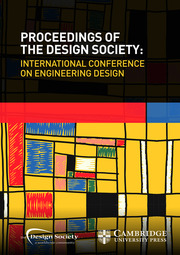Article contents
Game-Based Learning of Knowledge Reuse in Engineering Education
Published online by Cambridge University Press: 26 July 2019
Abstract
This paper presents an educational game fostering a new experience-based approach to teaching knowledge transfer using a codification strategy alone. The goal is to address and highlight some common issues and challenges that occur during knowledge transfer in product development and that are often difficult for especially students to grasp through exclusively a theoretical teaching approach. The game is introduced to 60 students in the final year of their Master's curriculum. In parallel, the game has been applied in a similar setting in a comparable higher educational institution, as well as in a product development organization.
“Sometimes you win—other times you lose and learn.”
- Type
- Article
- Information
- Proceedings of the Design Society: International Conference on Engineering Design , Volume 1 , Issue 1 , July 2019 , pp. 509 - 518
- Creative Commons
- This is an Open Access article, distributed under the terms of the Creative Commons Attribution-NonCommercial-NoDerivatives licence (http://creativecommons.org/licenses/by-nc-nd/4.0/), which permits non-commercial re-use, distribution, and reproduction in any medium, provided the original work is unaltered and is properly cited. The written permission of Cambridge University Press must be obtained for commercial re-use or in order to create a derivative work.
- Copyright
- © The Author(s) 2019
References
- 1
- Cited by


